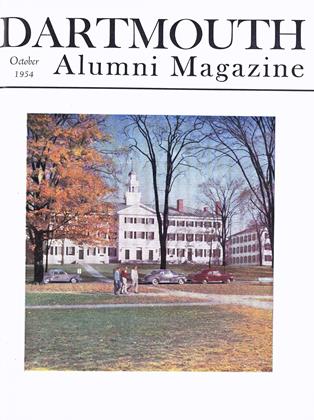A posthumous award to Edward N. Torbert '25, honoring his achievements with the U.S. Bureau of Reclamation, reveals his valuable contributions as a regional planning engineer, to his own country and also to American foreign policy projects abroad. Mr. Torbert had gone to Afghanistan on loan through the Technical Cooperative Administration as an adviser on water resource development in the Helmand Valley of Afghanistan, for which the United States Government had made an initial loan of $20 million. He was stricken with bulbar poliomyelitis in Kabul. Taken to a hospital in Karachi, Pakistan, by plane, he died eleven hours after arrival, on May 1, 1953.
After graduation from Dartmouth, Edward Torbert received the M.S. degree from the University of Chicago in 1927. Returning to the College, he taught for two years as an Instructor in Geography. In 1931 he was awarded the Ph.D. degree from the University of Chicago. He taught Geography for four years at San Jose (Calif.) State Teachers College, then returned East to work with TVA. From 1939 on his work as a planner of water resource development was done mostly in the West and abroad.
As an undergraduate, Torbert was active in the Outing Club and was president of the Canoe Club. After college he kept up his skiing and became an expert amateur photographer, winning prizes in exhibitions all over the world.
The citation for distinguished service, made by Douglas McKay, Secretary of the Interior, at the 13th Honor Awards Convocation of the Department of the Interior, follows:
Dr. Torbert entered the Bureau of Reclamation in November 1939 after having served with the Tennessee Valley Authority in 1935-38 and with the Pacific Northwest Regional Planning Commission from 1938-39. His initial duties as field coordinator of the Columbia Basin Joint Investigations at Ephrata, Washington included coordinating the work of 28 committees. In this capacity he made a significant contribution by initiating the preparation of data for the first comprehensive report on the development of the entire Columbia River Basin. In July 1944 he was appointed Regional Planning Engineer at Boise, Idaho, where he supervised studies covering the economic and engineering feasibility of 100 or more potential irrigation and multiple-purpose projects in the Pacific Northwest. For approximately three months in 1952 he was detailed to the Institute of Inter-American Affairs to investigate and advise on plans for developing the Artibonite Valley of. Haiti. In January 1953 he was loaned through the Technical Cooperative Administration as adviser on water resource development in the Helmand Valley of Afghanistan. It was while engaged in the strenuous task of organizing and developing his staff there that he was fatally stricken with bulbar poliomyelitis. His death on May 1, 1953, terminated the fine job he was doing in organizing and laying the groundwork for this vital foreign-aid program. Broad in his thinking, considerate in his approach, firm in his beliefs, skillful in his operations, and unyielding in his devotion to purpose, Dr. Torbert represented the finest ideals of Government service. In recognition of his many attributes and accomplishments, the Department of the Interior grants its highest honor, the Distinguished Service Award, to Dr. Torbert posthumously.
Edward N. Torbert '25
 View Full Issue
View Full Issue
More From This Issue
-
 Feature
Feature"The Working of the Religious Element"
October 1954 By GEORGE H. COLTON '35 -
 Feature
Feature"The Individual and the College"
October 1954 By FRANK PEMBERTON -
 Feature
FeatureNew Faculty Faces
October 1954 -
 Feature
FeatureLiveliest Point of the Summer
October 1954 -
 Feature
FeatureTHIRTEEN IS LUCKY
October 1954 -
 Class Notes
Class Notes1918
October 1954 By ERNEST H. FARLEY, W. CURTIS GLOVER, RICHARD P. WHITE
Article
-
 Article
ArticleBILL CUNNINGHAM MAKES IT CLEAR
January 1941 -
 Article
ArticleGround Training Course
December 1942 -
 Article
ArticleAcademic Delegates
JUNE 1965 -
 Article
ArticlePalm Beach
February 1960 By H. JOSEPH MCDONALD '51, WILBUR L. TAYLOR -
 Article
ArticleHOW THE OUTING CLUB "BREEDS BACK" TO PLATO
December, 1922 By JOHN E. JOHNSON -
 Article
ArticleFormer "Wearer of the Green" now sports black and white
OCTOBER, 1908 By Steve Farnsworth '83

